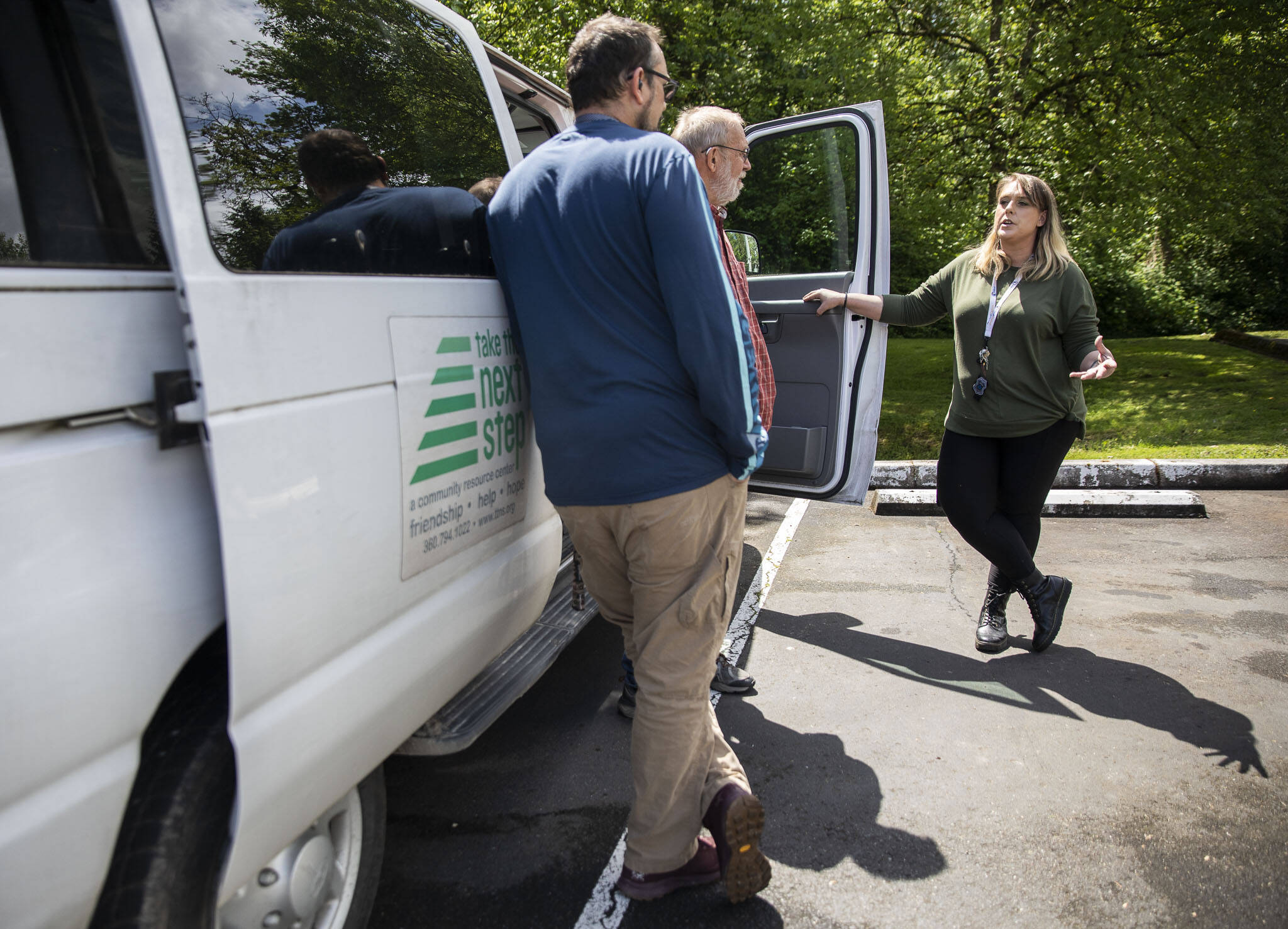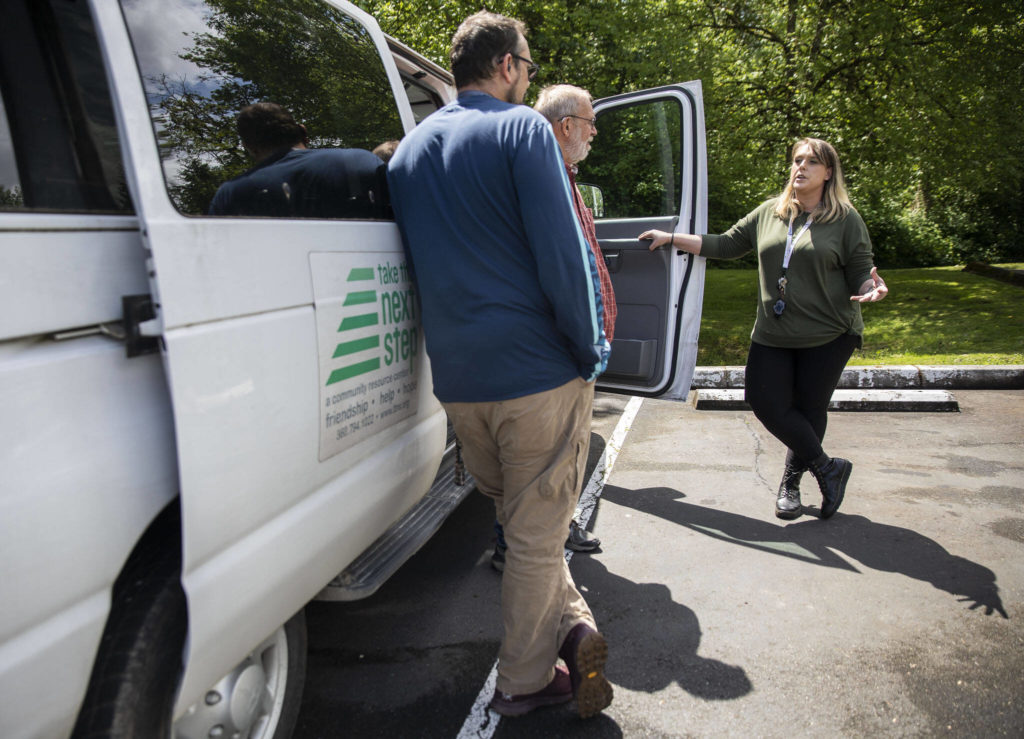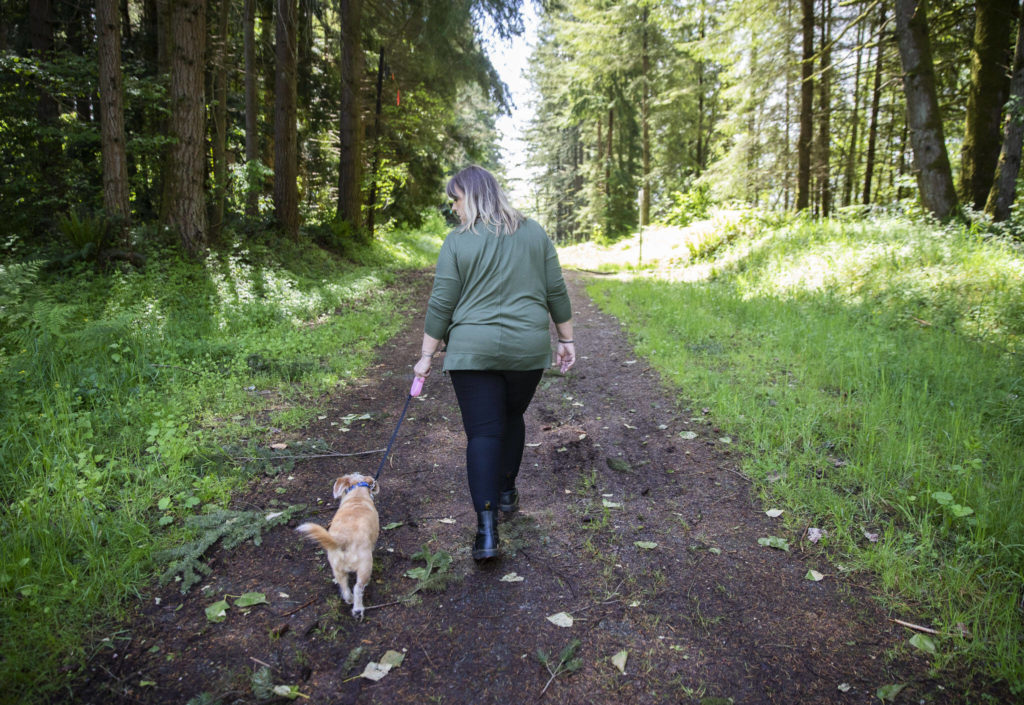EVERETT — April Provost is “still getting used to noticing the beauty in things,” she said one morning while driving down Marine View Drive.
Her blue eyeshadow sparkled in the sunlight as she pointed to a place she once slept on the side of the road lined with rhododendrons.
“Before, it was always about just looking for my next spot to camp,” she said. “Now, I see the houses and the flowers.”
Provost, 47, of Everett, celebrated three years sober this year. These days, she spends much of her time driving around Western Washington trying to help people recover from substance abuse. She’s a peer outreach specialist for Ideal Option, a local outpatient addiction clinic, and she divides her time between Snohomish, Skagit and Whatcom counties.
Before she hit the road to the Skykomish River valley one spring morning, Provost filled her SUV with blankets, personal hygiene products, water bottles, clean socks and naloxone, a drug that can reverse an opioid overdose. She parked outside the Monroe Library and met with Michael Lorio, a social services outreach specialist for the nonprofit Take the Next Step.
Lorio pulled over when he and Provost spotted a familiar face walking down the side of the road, pushing a bike.
“I used to camp right next to him when I was using,” Provost said.
Lorio handed the man a bag full of food: peanut butter and jelly sandwiches, juice, granola bars. He was shivering and asked Lorio if he had any coats his size. Lorio dug around in his van until he found one.
Provost talked to the man about getting into detox and finding housing.
“You can do it,” she said.
Lorio used a mobile tablet to take down the man’s information to get him signed up for a free cellphone through a program his nonprofit offers. In Snohomish County, a phone is crucial for people who want to recover from addiction, especially those who camp in remote areas, Lorio said.
“With housing being as critical as it is, being contacted by a housing navigator or not contacted can make the difference of finding housing or having your name cut from the list,” he said.
Consistent contact with those in addiction is an important part of a social worker’s job, because it builds trust, Lorio and Provost said.
“They know who we are,” Lorio said. “Not everybody likes me, not everybody agrees with me, but everybody knows exactly where I stand — what I can do for them. Real change has to be activated from the inside. It has to be their choice.”
After a couple hours in Monroe, Provost made her way east on U.S. 2, toward Stevens Pass, for more outreach.
“We’re going to take the scenic route,” she said, as she turned onto a dirt road outside of Sultan. “I haven’t been up here in a long time.”
She pointed down a grassy hill at a spot she used to live out of a Jeep Cherokee with a group of people.
“When you’re using and you’re driving without a license, or you’re driving when you shouldn’t be, these back roads become pivotal,” Provost said. “You want to stay off the highways as much as possible. We learned all the little ins and outs to circumvent the main drags.”
About 15 years ago, Provost said a doctor prescribed her hydrocodone for chronic pain. She got hooked, she said, and started seeking other opioids such as oxycodone and fentanyl.
“I could convince myself and those around me that I was OK for a while,” she said. “But I could never do it for very long, and it got to the point where I just didn’t even try.”
Provost’s marriage fell apart. She lost her family, her housing and her job. She felt she had nothing to lose at that point, she said — nothing to live for or keep her grounded.
“I was willing to do anything to numb how unmanageable and (expletive) up my life had gotten,” she said.
She found a new drug that kept her awake: methamphetamine.
“I didn’t want to sleep,” she said. “I didn’t want to dream. I didn’t want my mind to go unaltered and unchecked, because it would just be a reminder of my pain.”
Now, her job in outreach can be heartbreaking. She has to accept that some people will never kick their addiction. Some days she makes contact with several people. But a lot of the time, she only finds one or two.
“That’s what makes it so very difficult to do this, is being able to locate them — it’s a very transient community,” she said.
In Sultan, Provost stopped at a home where she knew a woman struggling with addiction.
“There have been some overdoses at this house,” she said before getting out of the car. “These are people I know well. I just want to make sure they’re safe.”
She knocked on the front door and a woman stepped out. They hugged each other and caught up. Provost handed the woman naloxone kits.
“At this point,” she said as she drove away, “they all know what I do. So now it’s a matter of just showing up, being there and letting them know they can come to me when they’re ready to pursue treatment.”
She can’t help everybody. Even when people ask for help, there are countless barriers that complicate the process. In Snohomish County, Provost said it’s hard to find a detox bed on a moment’s notice. There are waitlists, she said, and it takes hours for her to call facilities, coordinate with a patient’s insurance and get a hold of people.
“Everyone thinks it’s so easy and it’s just this personal choice,” she said. “But getting people into treatment is tricky. One problem I run into quite frequently is detox centers have to talk to the patient on the phone to do an intake. I can’t do it for them as a representative. Half my people don’t have reliable phone service.”
On the way back to Everett, she reflected on how she never thought about the future while using — aside from where she would find the next bag of dope.
Provost’s partner, Andy Watne, was able to schedule a detox bed date for her in 2019 at the Snohomish County Diversion Center. Provost and Watne got engaged earlier this year. The pair volunteers together, helping others to recover like they did.
Watne said he wouldn’t be where he is today without Provost. She has a special gift for outreach, he said.
“She’s found that she’s able to connect with these people on a deeper, personal level because she’s lived on the streets herself,” Watne said. “It’s just like talking to a friend. She’s got such love for everyone and wants them to get better. I’m so proud of her.”
As Provost drove into Everett, she admired a neighborhood she passed through and pointed out a house she likes.
“I’ve always wanted a house like that,” she said, “the kind with a master bedroom with French doors that open onto a balcony.”
She’s no longer afraid to dream.
Ellen Dennis: 425-339-3486; edennis@heraldnet.com; Twitter: @reporterellen.
Talk to us
> Give us your news tips.
> Send us a letter to the editor.
> More Herald contact information.



























